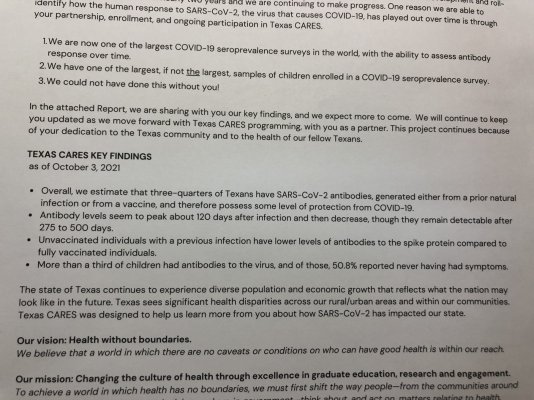So relative risk of breakthrough by vaccine
Moderna 1
Pfizer 1.45
JNJ 2.58
Although adults with any of the vaccines are eligible and should IMO get boosters it seems based on these data that the initial Moderna series was much better.
Well, it's complicated. The Oklahoma data is similar to DC's but not identical. Based on the numbers in the link I provided, there were 30% more breakthrough cases in OK among Pfizer recipients than Moderna. There were 194% more cases among JnJ recipients than Moderna.
One thing which is unexplained regarding the DC data is that DC includes breakthrough cases that are "confirmed" cases, as well as "self-reported" cases. Both were totaled to give the percentages published. For unknown reasons, there was a much higher percentage of self-reported cases among Pfizer & JnJ recipients than Moderna. I discussed this with a physician friend who works in a DC hospital, and he couldn't think of any explanation. I have to wonder if there have been more Moderna cases which weren't self-reported, but if so, why?
The much larger dose made a difference?
Well, that's complicated, too. I've read that there is some speculation that the additional week between Moderna shots compared to Pfizer shots in the US could have been beneficial. I know that in Canada, those recommended time periods were bypassed in favor of getting as many 1st doses in arms as possible. That strategy may have paid off.
The current new infection rate in Canada is much lower than in the US, and that includes US states in New England which have vaccination rates nearly as high as those than in Canada. New case rates have exploded throughout US states along the Canadian border as the weather has gotten colder, regardless of the vaccination levels of the states. Many highly vaccinated US states also have high percentages of adults who have already received boosters, too (over 31% of vaccinated Vermonters have already received a booster shot). But the new case rate throughout Canada has stayed low as it's gotten colder, unlike in the US or central Europe. I believe that proof of vaccination is required to enter most indoor facilities in at least some Canadian provinces, including Ontario and Quebec.
As for the dose differences, my understanding is that the Phase I and Phase II trials were, among other things, intended to determine the optimal dosage. I don't know enough about how the Moderna vaccine is made compared to how the Pfizer vaccine is made, to know what the actual volume of vaccine in each dose may indicate.


